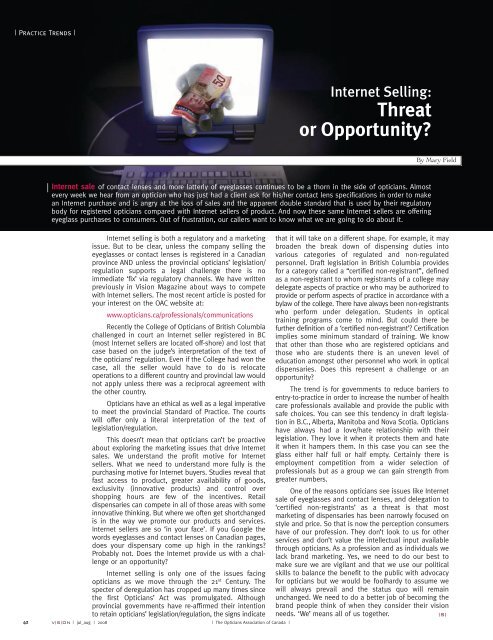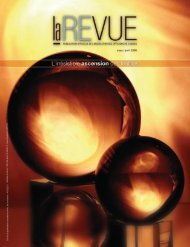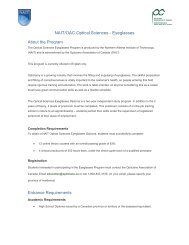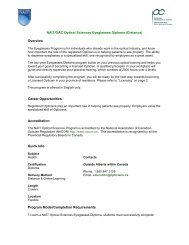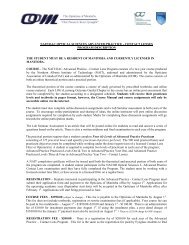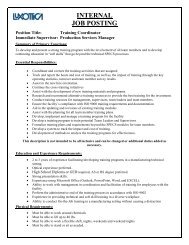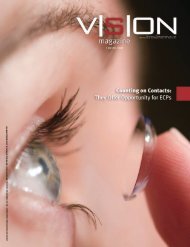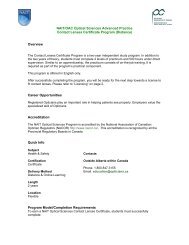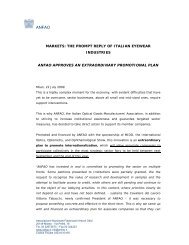Bionic Eye
Bionic Eye
Bionic Eye
You also want an ePaper? Increase the reach of your titles
YUMPU automatically turns print PDFs into web optimized ePapers that Google loves.
| Practice Trends |<br />
42<br />
|<br />
Internet sale of contact lenses and more latterly of eyeglasses continues to be a thorn in the side of opticians. Almost<br />
every week we hear from an optician who has just had a client ask for his/her contact lens specifications in order to make<br />
an Internet purchase and is angry at the loss of sales and the apparent double standard that is used by their regulatory<br />
body for registered opticians compared with Internet sellers of product. And now these same Internet sellers are offering<br />
eyeglass purchases to consumers. Out of frustration, our callers want to know what we are going to do about it.<br />
Internet selling is both a regulatory and a marketing<br />
issue. But to be clear, unless the company selling the<br />
eyeglasses or contact lenses is registered in a Canadian<br />
province AND unless the provincial opticians’ legislation/<br />
regulation supports a legal challenge there is no<br />
immediate ‘fix’ via regulatory channels. We have written<br />
previously in Vision Magazine about ways to compete<br />
with Internet sellers. The most recent article is posted for<br />
your interest on the OAC website at:<br />
www.opticians.ca/professionals/communications<br />
Recently the College of Opticians of British Columbia<br />
challenged in court an Internet seller registered in BC<br />
(most Internet sellers are located off-shore) and lost that<br />
case based on the judge’s interpretation of the text of<br />
the opticians’ regulation. Even if the College had won the<br />
case, all the seller would have to do is relocate<br />
operations to a different country and provincial law would<br />
not apply unless there was a reciprocal agreement with<br />
the other country.<br />
Opticians have an ethical as well as a legal imperative<br />
to meet the provincial Standard of Practice. The courts<br />
will offer only a literal interpretation of the text of<br />
legislation/regulation.<br />
This doesn’t mean that opticians can’t be proactive<br />
about exploring the marketing issues that drive Internet<br />
sales. We understand the profit motive for Internet<br />
sellers. What we need to understand more fully is the<br />
purchasing motive for Internet buyers. Studies reveal that<br />
fast access to product, greater availability of goods,<br />
exclusivity (innovative products) and control over<br />
shopping hours are few of the incentives. Retail<br />
dispensaries can compete in all of those areas with some<br />
innovative thinking. But where we often get shortchanged<br />
is in the way we promote our products and services.<br />
Internet sellers are so ‘in your face’. If you Google the<br />
words eyeglasses and contact lenses on Canadian pages,<br />
does your dispensary come up high in the rankings?<br />
Probably not. Does the Internet provide us with a challenge<br />
or an opportunity?<br />
Internet selling is only one of the issues facing<br />
opticians as we move through the 21st Century. The<br />
specter of deregulation has cropped up many times since<br />
the first Opticians’ Act was promulgated. Although<br />
provincial governments have re-affirmed their intention<br />
to retain opticians’ legislation/regulation, the signs indicate<br />
VISION | jul_aug | 2008 | The Opticians Association of Canada |<br />
Internet Selling:<br />
Threat<br />
or Opportunity?<br />
By Mary Field<br />
that it will take on a different shape. For example, it may<br />
broaden the break down of dispensing duties into<br />
various categories of regulated and non-regulated<br />
personnel. Draft legislation in British Columbia provides<br />
for a category called a “certified non-registrant”, defined<br />
as a non-registrant to whom registrants of a college may<br />
delegate aspects of practice or who may be authorized to<br />
provide or perform aspects of practice in accordance with a<br />
bylaw of the college. There have always been non-registrants<br />
who perform under delegation. Students in optical<br />
training programs come to mind. But could there be<br />
further definition of a ‘certified non-registrant’? Certification<br />
implies some minimum standard of training. We know<br />
that other than those who are registered opticians and<br />
those who are students there is an uneven level of<br />
education amongst other personnel who work in optical<br />
dispensaries. Does this represent a challenge or an<br />
opportunity?<br />
The trend is for governments to reduce barriers to<br />
entry-to-practice in order to increase the number of health<br />
care professionals available and provide the public with<br />
safe choices. You can see this tendency in draft legislation<br />
in B.C., Alberta, Manitoba and Nova Scotia. Opticians<br />
have always had a love/hate relationship with their<br />
legislation. They love it when it protects them and hate<br />
it when it hampers them. In this case you can see the<br />
glass either half full or half empty. Certainly there is<br />
employment competition from a wider selection of<br />
professionals but as a group we can gain strength from<br />
greater numbers.<br />
One of the reasons opticians see issues like Internet<br />
sale of eyeglasses and contact lenses, and delegation to<br />
‘certified non-registrants’ as a threat is that most<br />
marketing of dispensaries has been narrowly focused on<br />
style and price. So that is now the perception consumers<br />
have of our profession. They don’t look to us for other<br />
services and don’t value the intellectual input available<br />
through opticians. As a profession and as individuals we<br />
lack brand marketing. Yes, we need to do our best to<br />
make sure we are vigilant and that we use our political<br />
skills to balance the benefit to the public with advocacy<br />
for opticians but we would be foolhardy to assume we<br />
will always prevail and the status quo will remain<br />
unchanged. We need to do a better job of becoming the<br />
brand people think of when they consider their vision<br />
needs. ‘We’ means all of us together. ISI


